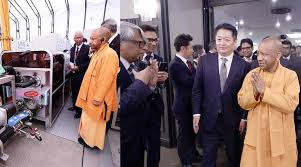Rajnath Singh Takes Firm Stand on Terror: Refuses to Endorse SCO Declaration in Qingdao
IIE DIGITAL DESK : India's Defence Minister Rajnath Singh acted decisively on June 26, 2025, at the Shanghai Cooperation Organisation (SCO) Defence Ministers’ meeting in Qingdao, China, refusing to attach New Delhi's signature to the proposed joint statement. Singh’s move underscored India’s growing impatience with vague diplomatic language that fails to address cross-border terrorism—especially threats emanating from Pakistan-supported networks .
The SCO, comprising India, China, Pakistan, Russia, Iran, and four Central Asian nations, operates on a principle of unanimity. When Singh declined to endorse the communique, his firm stance effectively nullified the document, signaling India’s unwillingness to compromise on core security concerns .
Sources confirm the draft statement omitted any mention of the April 22 Pahalgam massacre, where 26 civilians were killed in a terrorist attack claimed by The Resistance Front, a satellite group of Pakistan-based Lashkar-e-Taiba (LeT). Simultaneously, the document referenced unrest in Balochistan, widely perceived as reflecting Pakistan’s narrative—an exclusion India found unacceptable .
In his address, Singh stressed, “There should be no double standards when it comes to combating terrorism.” He reiterated that terrorism and peace are incompatible, reinforcing India’s commitment to hold terror perpetrators, sponsors, and financiers accountable .
He pointed to Pahalgam as a stark example: victims were targeted based on religion, reinforcing Lashkar-e-Taiba and TRF’s role. India’s military response—Operation Sindoor on May 7—targeted terror camps across the border, sending a message that “epicentres of terrorism are no longer safe”.
Singh’s presence in Qingdao also marked the first official visit by an Indian defence minister to China since the 2020 Galwan Valley clash, amid frail attempts to restore military communication channels. Though the meeting included bilateral discussions with China’s Defence Minister Admiral Dong Jun, the broader tone reflected restrained cooperation rather than reconciliation .
India’s refusal to sign echoes previous instances—such as avoiding endorsements of the Belt and Road Initiative and BRICS currency proposals—highlighting New Delhi’s insistence on maintaining strategic autonomy within forums heavily influenced by China and Pakistan.
Beyond terrorism, Singh issued a broader alert, advocating vigilance against youth radicalisation and the misuse of technologies like drones and cyber-weapons. He emphasised the SCO’s Regional Anti-Terrorist Structure (RATS) as a critical tool, urged for coordinated safeguards, and rejected any excuse for nations sheltering terror networks .
By withholding endorsement, India has reaffirmed a no-compromise stance: security commitments must be explicit, not ambiguous. Singh’s position—asserting India’s right to proactive defense and rallying SCO partners for an uncompromising counter-terror agenda—is a defining moment in regional diplomacy.
With tensions high and global power dynamics shifting, India’s bold move in Qingdao signals a shift away from passive consensus-building, instead forging a path anchored in assertiveness, accountability, and strategic clarity.
You might also like!



























